Cultures doesn't matter. They're bourgeois inventions tat need to fade away. We're all Proletarians.
Let the ruling classes tremble – an Interactive Revolutionary AAR
- Thread starter Tommy4ever
- Start date
-
We have updated our Community Code of Conduct. Please read through the new rules for the forum that are an integral part of Paradox Interactive’s User Agreement.
You are using an out of date browser. It may not display this or other websites correctly.
You should upgrade or use an alternative browser.
You should upgrade or use an alternative browser.
- Status
- Not open for further replies.
Cultures doesn't matter. They're bourgeois inventions tat need to fade away. We're all Proletarians.
Try saying that to a Russian. He'll tell you "Я не могу понять вас. Говорите ли вы Россию?"
We are all proletarians, but how does this preclude us from also being Germans, Walloons, Flemings, Poles and Czechs? How does this preclude us from taking pride and identity in our individual professions, industries, and factories? We are all proletarians yes, members of the international socialist working class, but why can we not also be members of a nation, members of a union? Where is the contradiction? The imposition of this unnecessary choice is oppression of the worker's right to identify himself as he wishes adn to assemble as he wishes, be it as part of a nation, part of a union or both. One need not abandon the proletariat to be a nationalist and unionist.
Free the nations, Create the Unions, Power to the Workers, With struggle the Revolution advances.
Free the nations, Create the Unions, Power to the Workers, With struggle the Revolution advances.
A potential rallying call for the Nako's in four languages:
Volke und Arbeitsverbanden, Freiheit und Kampf
Narodow i Zwiazeki, Wolnosc i Walki
Peuple et Syndicaux, Liberte et Luttes
Volken en Vakbonden, Vrijheid en Strijd
(i know no Polish but decided to use google translate to try and include it)
In English:
Peoples and Unions, Freedom and Struggle
The French is a bit catchy, and if you take the letters for the Flemish and German that sounds good too. I have no clue on the Polish. When I say catchy, I mean its a good chant.
Volke und Arbeitsverbanden, Freiheit und Kampf
Narodow i Zwiazeki, Wolnosc i Walki
Peuple et Syndicaux, Liberte et Luttes
Volken en Vakbonden, Vrijheid en Strijd
(i know no Polish but decided to use google translate to try and include it)
In English:
Peoples and Unions, Freedom and Struggle
The French is a bit catchy, and if you take the letters for the Flemish and German that sounds good too. I have no clue on the Polish. When I say catchy, I mean its a good chant.
The Swedish version might sound a bit bad for English speakers.
Folk och Fack, Frihet och Kamp!
Folk och Fack, Frihet och Kamp!
And again no Naki have responded the great problem. Where do you put the frontier of Poland ? where do you put the frontier in the Balkans ? where do you put the frontier between Hungaria and Romania ? where do you put the frontier between Italy and german-speaking Austria ? do you put Alsace-Moselle with France (Alsace happily participated in the french revolution) or with Germany ? where do you put the frontier between Danemark and Germany ? Do you put the walloons alone or with the french ? Do you put the flemish alone or with the dutch ? What happens to people who are on the wrong side of the frontier ? Do they have to learn the language of their new nationality or do they have to go away ? The VSVR is great enough to have translation in the languages of all the minorities, will the small polish state be able to do this for it's russian, byelorussian, ukrainian, flemish, german, slovak and lithuanian minority ?
And the marxist were from the start for the introduction of every revolutionary state in the VSVR [ooc : something Tommy couldn't do].
I for one want a faction which want a mixed centralist, unionist, Soviet economy.
Comrade Zakharov, from the Strasbourg Soviet
And the marxist were from the start for the introduction of every revolutionary state in the VSVR [ooc : something Tommy couldn't do].
I for one want a faction which want a mixed centralist, unionist, Soviet economy.
Comrade Zakharov, from the Strasbourg Soviet
The goal is the World Revolution and the Dissolution of the State. National Identities only create frictions within the Revolution and are Bourgeois attempts to make the dissolution of the State impossible.
Keynes: Try saying that to a Russian. He'll tell you "Я не могу понять вас. Говорите ли вы Россию?"Cultures doesn't matter. They're bourgeois inventions tat need to fade away. We're all Proletarians.
This is probably best piece of support the NCs have ever had.
The goal is the World Revolution and the Dissolution of the State. National Identities only create frictions within the Revolution and are Bourgeois attempts to make the dissolution of the State impossible.
Do the states of South America war against one another? No, their individual national statehood preserves unity! Shall we let the people of the lands see our great revolution as a foreign conquests? Shall we repress the worker his national self expression? No!
The Leninist policy of world dominition is leading to a World in Shackles. We must divide the world to prevent an eternal reign of the Cult of Lenon!
Shall we abolish the State when the Revolution is complete: Yes!!
How the hell are we going to do this if there still are a lot of states everywhere?
How the hell are we going to do this if there still are a lot of states everywhere?
Do the states of South America war against one another? No, their individual national statehood preserves unity! Shall we let the people of the lands see our great revolution as a foreign conquests? Shall we repress the worker his national self expression? No!
The Leninist policy of world dominition is leading to a World in Shackles. We must divide the world to prevent an eternal reign of the Cult of Lenon!
You do realise that there have been countless wars in South America for territorial gain and oppression against one and other, right? And most of the states there speak the same language and have a common history. Think of how badly it will be when the states have utterly different languages and little common national history.
And where do we draw the borders? The eastern border contains a mix of Germans and Poles. Many of them in enclaves surrounded by the other. Both people lose out through a border. The same is true in Bohemia-Moravia, Alsace and Lorraine, and most of the border lands. Nationalism does nothing but cause strife and hatred between people. It is better to work to wiping away nationalism and replace it with international brotherhood.
Actually it should beNarodow i Zwiazeki, Wolnosc i Walki
Narody i Związki, Wolność i Walka.
As for nations, doesn't the revolution aim from a world state, or rather, the lack of one anywhere? How could the creation of more nations which will be dissoluted soon(1935 I hope?
Last edited:
How about we abolish cultures?
And languages?
And the proletariat so that the non-proletariat do not feel discriminated or socially oppressed?
And languages?
And the proletariat so that the non-proletariat do not feel discriminated or socially oppressed?
Why not simple self determination. There is no imposition of a border and no exchange of populations. Simply plebiscites are given on either the state or province level, and the border is drawn to match. Since the states are still unified as members of Commintern, borders need not make logistic sense. The creation of the nations is simply to recognize that the nationalities exist, and allow each to have its own government and homeland should it so choose. Bodies such as unions may remain transnational, and would ideally be held in common for all of Commintern with possible national chapters. As stated above, while we are all proletarians we are also members of our nation and our trade. Such bonds already exist, why not recognize and use them. Also is not the separation of the Germans and Italians a separation of nations, and what of Moravia, was it not too separated to recognize the Czechs and Germans. The dissolution may not be complete, but why did we break up the state of Austria-Hungary at all? If the borders of nations are as artificial as any others as you claim, why were they implemented by our own government abroad?
Given that South America is largely within Commintern now, I doubt competition among its states persists. They are a set of nations, proud of their identity but united in peace and socialism and in their resolve against the capitalist foes outside Commintern, a model to emulate potentially.
Given that South America is largely within Commintern now, I doubt competition among its states persists. They are a set of nations, proud of their identity but united in peace and socialism and in their resolve against the capitalist foes outside Commintern, a model to emulate potentially.
Why not simple self determination. There is no imposition of a border and no exchange of populations. Simply plebiscites are given on either the state or province level, and the border is drawn to match. Since the states are still unified as members of Commintern, borders need not make logistic sense. The creation of the nations is simply to recognize that the nationalities exist, and allow each to have its own government and homeland should it so choose.
And if we create nationalist separations how do we prevent the destruction of the smallest languages and cultures ? For example in the caucasus, are we to create a state for each minority even if it has only a few people ? Do you want to abolish the state or to create more states ? And what if people don't want to be part of any nations but want to retain their culture ? And what if there is small pocket of a culture in another culture ? Exclave ? Exclusion ?
You and the others Naki are using fallacious arguments. You can be proud to be of any culture even if you are not in a nation corresponding to it ! There is flemish people all over the VSVR ? are they abandoning their culture ? NO. They are proud of their heritage and proud to be part of the VSVR. It's only in your Naki propaganda and lies that they can't be proud of their culture. As long as the VSVR maintain a pro-minority policy of using the minorities languages, keeping the VSVR a multi-cultural union will be good.
I agree with Zakharov. What is the connection between language, culture and state? Why must each language and culture have a separate state? Culture has very little to do with politics, and states are about politics.
Didn't you get the memo? Us NatComs are supposed to be all rainbows and sunshine until we take power and then we rip off the masks and turn out to actually be evil capitalists planning to suppress the masses. I thought all the NatComs knew our ultra secret plan?
NC Memo #3
Didnt you read the second memo in which it said that members must have either been loyal to the NC for at least two weeks for knowing the ultra secret plan? Anyways you werent in the True Germans faction so u dont know the ultra-secret uber plan of revisionist reactionary burgeoise reaction to react upon the way Trotsky reacted to the reactionary policy of the True Germans.
Yours reactingly
LeCare
P.S. Its Voelker und Arbeitsverbaende, as German nationalists we should somewhat respect the syntax
Even better would be Voelker und Gewerkschaften though
The VSVR 1905-1910
The troika government in the VSVR during Trotsky’s 2nd term as Chairman made it very difficult for major changes to take place as every policy required the support of Trotsky, Goldman and Drexler. Beyond the initial political convulsions of early 1905 few major changes took place within the VSVR (with two major exceptions that shall be dealt with later). However beyond the borders of the Republic and beyond the Comintern the capitalist and feudal world was going through a period of unprecedented turmoil.
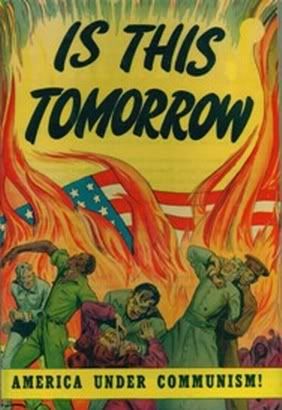
The Western world had experienced Red Scares in the past. The usually coincided with aggressive foreign policy coming from Cologne but the Red Scare of the early 20th century was of unprecedented magnitude. At the turn of the century the Labour Party in Britain and the ASP in the US were the two single largest political parties in their respective countries and were only contained by coalitions of liberals and conservatives. Prior to Trotsky’s assumption of power in the VSVR both frequently supported the First International and had positive, if strained, relations with Cologne. The Great War changed all this as both political parties damned the Comintern and took definite shifts to the right in order to disassociate themselves with the rising anti-communist emotions running through their countries. After the war these more moderate socialist parties seemed to have managed to survive the storm. However the Red Scare was only just beginning.
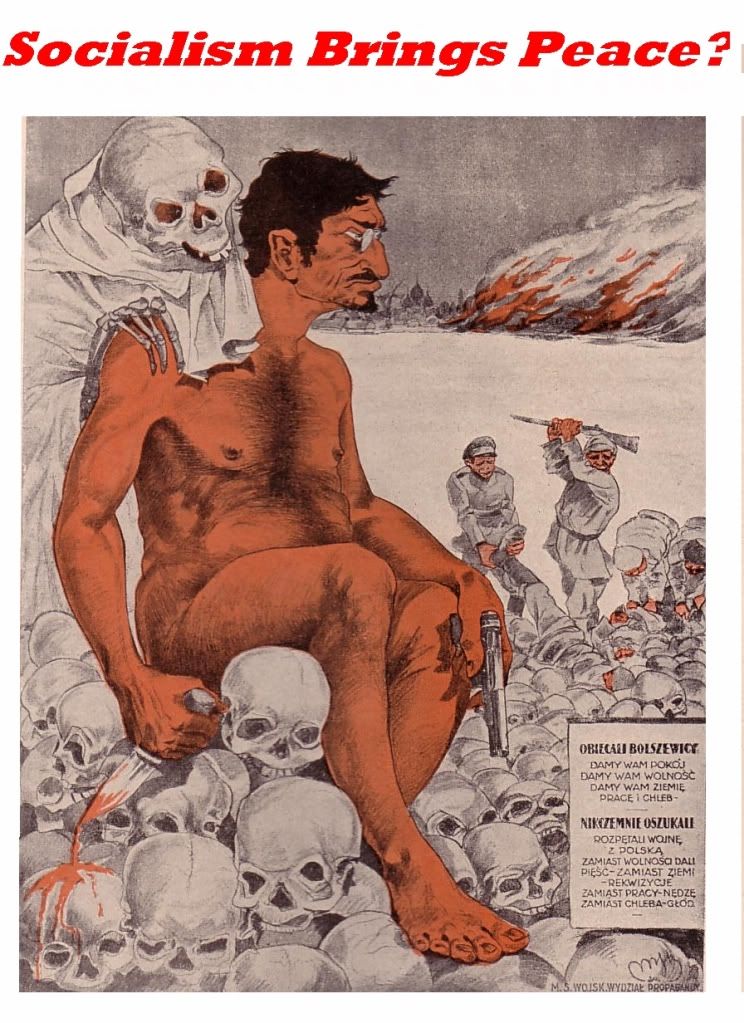
In 1904 the Republican Democrats ran against the ASP in what was expected to be a tight race for the Presidency. However big buissness united around the Republican Democrats in a manner unseen before in the history of Western democracy. The funding for Alton B. Parker’s Presidential campaign was 10 times that spent by all sides in the previous Presidential election. The campaign seemed to be almost totally focussed upon smearing the Left. The ASP were portrayed as willing puppets of the Trotskyite conspirators who wished to bring Marxist tyranny to the fair shores of the United States. The ASP would bring down Christianity, deny the enterprising American the right to better himself and would slaughter all those who did not bow before the alters of Lenin and Marx. The Reds would invite Germans into the homes of Ney Yorkers to rape their daughters and would hand over the farms of the South to be collectivised and handed over the black minority who would in turn gratefully send the profits funnelling into projects to beautify Cologne and Petrograd.
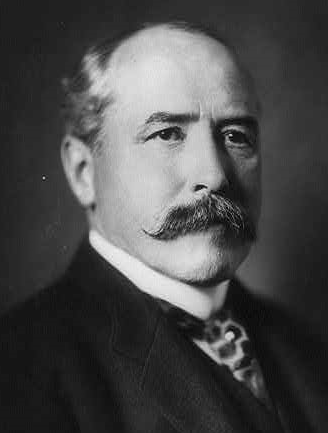
Parker smashed to victory winning over 75% of the popular vote and all but 4 states (New York, Ohio, Michigan and Massachusetts – ie the most industrial parts of the country). In his opening address to the nation he swore to roll back international Trotskyism, defeat the Red enemy within and empower the common man not through collectivism but through a freer and more open market. The reactionary backlash had begun.
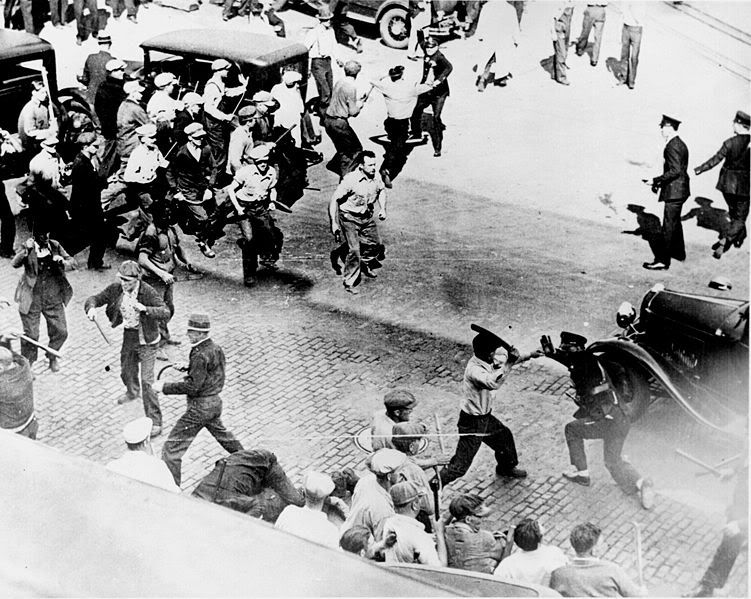
It didn’t take long for an anti-communist witch hunt to begin as more radical members of the ASP were revealed as agents of the VSVR (these claims were not entirely unfounded as many within the ASP did indeed support the VSVR and Comintern although these were in the minority of those persecuted). The Parker government also began a crackdown on Trade Unions – most notably the powerful Anarchist IWW (International Workers of the World). When workers went on strike in Detroit in protest against a local member of the ASP who had been jailed for treason the US army was sent in and 20 strikers were killed. Rather than provoke public outrage the incident hampered the Left. Many members of the ASP leftwing called out for action against the state – hopelessly misjudging the mood of the American people they further isolated the ASP and labour movement and made it all the easier for Parker to bring down the hammer against it.
On the international stage Parker travelled to London and Mexico City himself whilst US representatives travelled to Guatemala and Peking as Parker tried to organise a new League of Nations to hold back the socialist menace. Meanwhile Parker began a programme for rapid military expansion on both land and sea.
This period is traditionally seen as the beginning of the ‘Cold War’ in which the two great armed camps of the Capitalist and Feudal powers and the Socialist International faced each other. It very nearly turned hot in late 1905 as events in the Middle East boiled over.
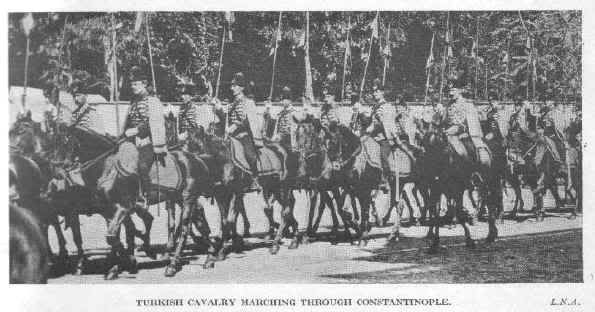
During the late 19th century the Ottoman Empire and its CSR successor had invaded Egypt in almost a routine manner. Sometimes the Turks won and seized sections of the Levant, but more often than not they were driven out or simply tired and turned home. So when the CSR invaded Egyptian held Palestine in the summer of 1905 few states took too much notice – the VSVR sent arms to its friend whilst the British and Americans sent similar supplies to Cairo and Alexandria. However in September things changed. About 20 miles North of Jerusalem the Turks won a stunning victory and captured almost the entire Egyptian army. At the same time a Leftist peasant uprising in Southern Sudan forced what few troops the Egyptians had left to head south in order to secure the unruly region. Both the Levant and the Nile were now fully open to the CSR – Egypt could not be allowed to fall.
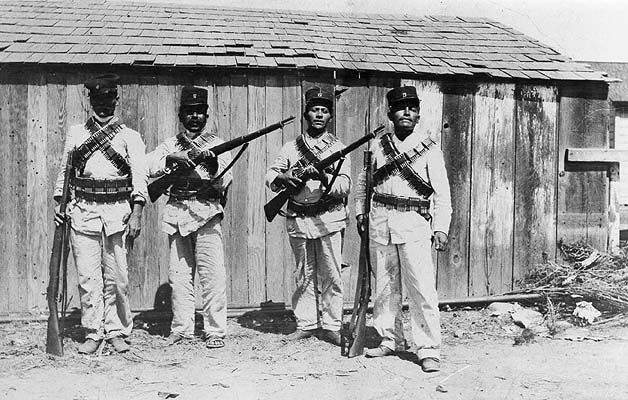
British or American intervention might have caused a wider conflict but by convincing the Central American powers to act the Anglo-Saxons could prop up Cairo without threatening war from Cologne. In October the USCA and in December Mexico began to send troops to Egypt to fight under the Egyptian banner against the Turkish invasion. Their impact was immediate. The extremely well equipped Central Americans and the numerous Mexicans combined to rout the CSR’s army near Jaffa and force them to withdraw from Palestine to the Lebanon and Syria. For several more months (as Romanian troops entered the fray on the side of the CSR) the two armies would battle over the powerful lines of fortresses in Syria and the Lebanon. The conflict finally came to an end in mid July 1906 just as Mexican troops approached Damascus – the CSR agreed to pay reparations and end the conflict.
It was a propaganda coup for the Capitalist Bloc as the seemingly unstoppable tide of the Comintern had been halted in its tracks by cooperation between the remaining powers. After the election of a fiercely anti-communist Tory PM in Britain who was heavily influenced by his young foreign Minister, Winston Churchill, the capitalist powers officially looked to sign an alliance. Churchill proved to be the master diplomat as he convinced the Chinese and Japanese Emperors alongside the Presidents of the USCA and Mexico to align with Britain and America – the two Anglo-Saxon powers whose economic interests still dominated those countries at the expense of their people. All powers agreed to intervene if ‘’the international influences of communism ever threatened to destroy the peace of the world again’’ – this vague agreement left plenty of room for the powers but set down a general idea that they would stand together should the VSVR strike again.
With the Red Scare sending the Left back generations in Britain and America one might wonder what occurred in the non-democratic members of the new anti-communist alliance.

In China opposition to the totalitarian rule of the corrupt Imperial court – secured almost solely by the unstoppable might of the Chinese Army – was extremely powerful. However, despite this power, the opposition remained divided. Nationalists, liberals, communists, religious minorities and general progressives were not strong enough to fight against the Imperial state. This had already been made clear by the brutally suppressed Muslim uprising in 1903 and then a major communist uprising in South China in 1905. Both had ended only in the deaths of thousands of civilians. As time progressed and opposition grew the state was only becoming more brutal and monolithic. With the assistance of a British instructed bureaucratic machine and Western arms and training the state now wielded a larger and more powerful army than ever before. This was where Dr Sun Yat-Sen came in. Sun Yat-Sen was the leader of the single largest oppositions force, the People’s Party – largely liberal Republican institution, and favoured the idea of a Popular Front against the Emperor.
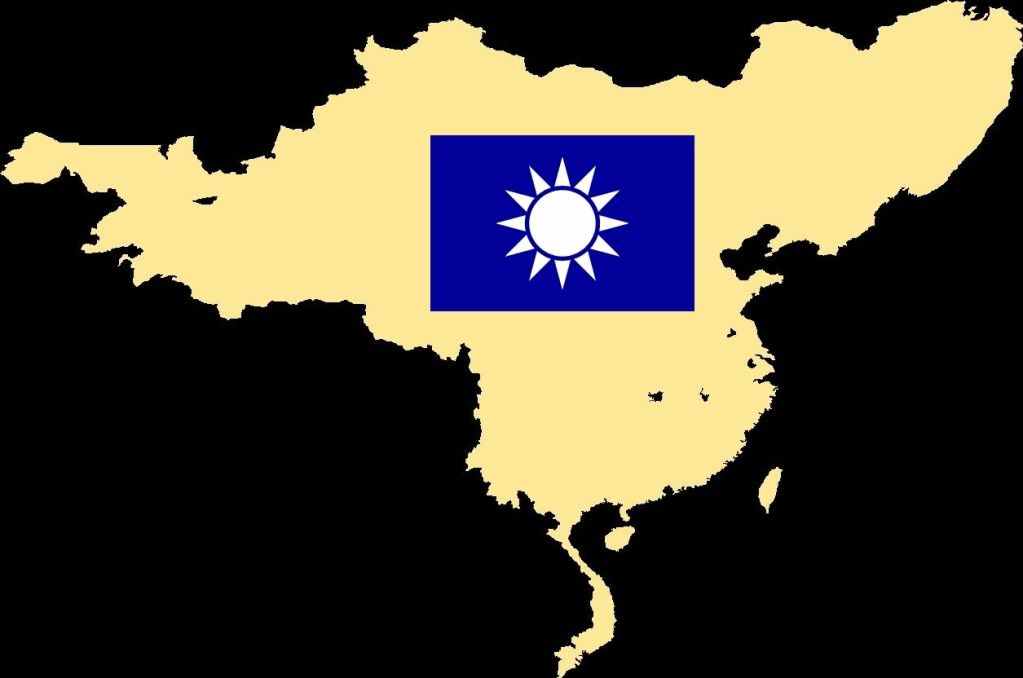
This led to the foundation of the Kuomintang (Nationalist Chinese People’s Party) in 1907. The KMT represented a colossal opposition force with influence in every party of the vast Chinese Empire. The KMT alliance consisted of the People’s Party, the Communist Party of China, the Progressive Front, the Liberal Alliance, the Muslim Brotherhood, Republican League, the Chinese Labour Association, The Peasant Alliance, the Viet Minh and dozens of smaller bodies. One huge Popular Front against the Imperial state.
Whilst the KMT seemed to be a new superpower its foundation caused indignation in Cologne. The Marxists were furious that the CCP had joined the Party as by doing so they allowed Sun Yat-Sen to monopolise the opposition to the state in the form of a bourgeoisie party. Within the Comintern Trotsky’s reputation took a major blow from this opposition as many rallied around Plekhanov who backed the KMT wholeheartedly and even began to clandestinely send arms across the border into Manchuria, Mongolia and Turkestan.
In Mexico and Central America unrest was at a much lower stage. Both states had their heavily industrialised areas. Mexico City had become an industrial sprawl to rival anything in the American North-East whilst the Californian coast had become a major centre of industry. In Central America there was perhaps half a dozen major industrial centres scattered across the nation. Yet in both countries the vast majority of the people were simply rural peasants who continued to endure a Feudal lifestyle with few modern comforts and plenty of state mandated oppression. In 1909 a major event would occur that would later become one of great significant for both states.
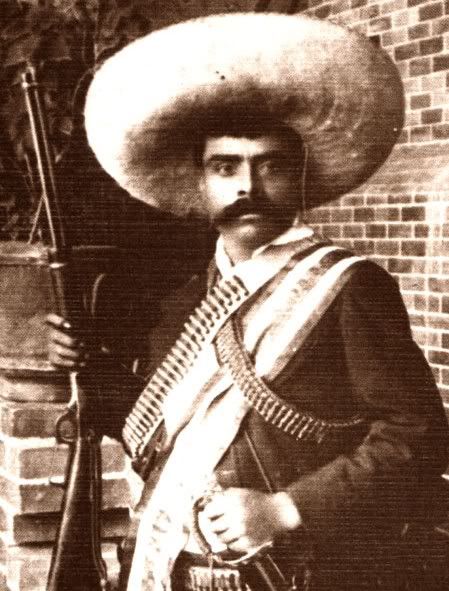
In 1908 a small village in Southern Mexico had elected the reasonably young middle class Mexican Emiliano Zapata to represent them in a dispute with their Feudal landlord. At first the landlord, fearing an insurrection, gave the village some concessions. With this a wider peasant movement demanded fairer treatment began to arise in both Mexico and the USCA. However, fearing the ballooning of the movement, in 1909 Mexican soldiers arrived in Zapata’s village and attempted to kill the idol of the peasantry and crack down on the centre of the peasant movement. Luckily Zapata was away at the time and was able to escape into the wilderness where he would begin to build up a powerful insurrection against the state.
Back in the VSVR 1906 saw the large scale reinstitution of Trade Unions at the behest of Drexler and the National Communists. Drexler had long been very moderate in his demands but facing pressure from bellow he went so far as to threaten to walk out of the troika if the Unions were not restored. From 1906 they would have little actual power but were able to represent the proletariat on an industry wide scale across the VSVR.
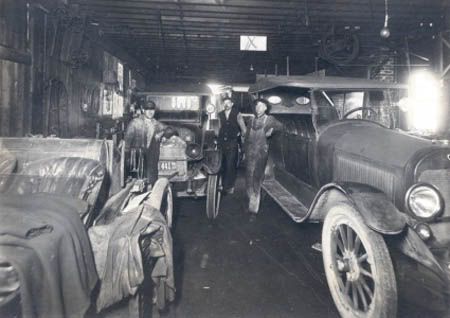
Economically the second half of the 1900s was perhaps the greatest period in the entire history of both the VSVR and the Comintern as a whole. In the VSVR, at least, the period also radically reshaped the country. Between 1905 and 1910 the VSVR industrial sector grew by an incredible 44% - considering the sheer size of the VSVR industrial sector these figures are truly mind boggling. That is the equivalent to two and a half Soviet Unions or three Chinas. Whilst the old industrial sectors did see major growth it was the new ‘modern’ industries that reported the most impressive profits and really changed the VSVR. Electrification had been an ongoing process since the 1890s but by the end of the 1900s it would be largely completed. With huge new factories pumping out telephones, electrical parts, automobiles, bicycles, tractors, new ships and even airships the country became a very different place. There was a tractor on every farm, mass proliferation of new forms of transport and the country became more connected than ever before. Whats more, with such large surpluses of manufactured goods millions across the entire Comintern received the benefits of being able to purchase the new modern goods being built in factories from Berlin and the Ruhr to Guinea and the Congo Basin.
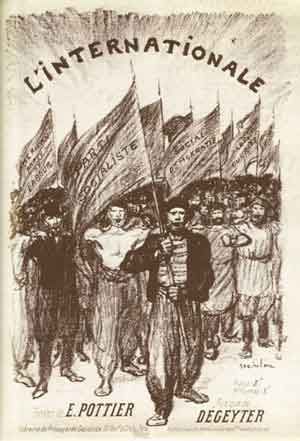
However economic success was not limited to the VSVR but was spread across the International. The so called ‘Socialist Tiger’ economy of Hungary proved to be the flagship of the Comintern wide boom. In the immediate aftermath of the Great War the Hungarian industrial sector had crashed and the state was only saved by VSVR funds that kept it afloat. However starting in 1904 Hungary began one of the most incredible periods of economic growth ever seen. Between 1904 and 1910 the industrial sector grew by 500% as the Hungarian industrial sector went from being the 19th to the 9th largest industrial sector on earth. At the same time agricultural output doubled and mining output increased by 80%. Indeed by the end of the decade, whilst still mid-boom, Hungary had started to exert its pretences to Great Power status as it doggedly pursued Mexico. Elsewhere the Spanish industrial sector grew by 200%, the Dutch by 50%, the Swedish by 40% whilst Chile, Argentina and Peru had all experienced major growth. Even the larger and already industrialised economies of the Soviet Union and France experienced strong growth with the Soviet industrial sector growing by 25% and the French by a not unimpressive 15%. However there was less encouraging news from elsewhere. Many states, most notably Brazil, failed to grow at all whilst Italy faced a contraction of 30% in its industrial sector after a failed attempt to transition from unprofitable textile industries to more modern industries resulted in a General Strike and large scale industrial failure.
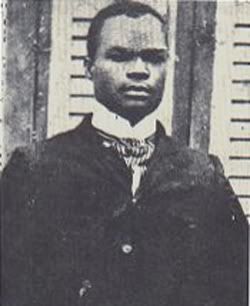
Perhaps the most significant political change in the VSVR during this period was the emergence of Pan-Africanism. Henry Sylvester-Williams was the driving force behind that movement. Particularly in the increasingly industrial Western regions of VSVR controlled Africa the growing class consciousness of the workers was creating a sense of conflict. Most were thankful to the VSVR for the introduction of socialism, economic prosperity and unprecedented levels of education in the region but by the early 20th century West Africa was no longer being propped up by the European VSVR but was actually a net contributor in the Republic’s finance (few of the old and unprofitable industries were present in the more modern and streamlined West African economy). Sylvester-Williams was originally born in the British colony of Trinidad in 1869. Educated in London he worked as a lawyer in South Africa during the 1890s. However after witnessing the poor treatment of native black African population by the British and Boers alike he became involved in radical politics. Advocating an independent, democratic, Pan-African state he was quickly drawn to the far left. During the Great War he was forced to leave South Africa after becoming involved in an anti-British guerrilla movement in the Zimbabwe and Zambia (then occupied by British forces). After the war he settled in the industrial city of Dakar – the effective capital of VSVR West Africa. From there he played a major role in the formation of the idea of African Nationalism – the idea had been present since the VSVR first arrived in Africa two decades before but it did not truly come to a head until the late 1900s.
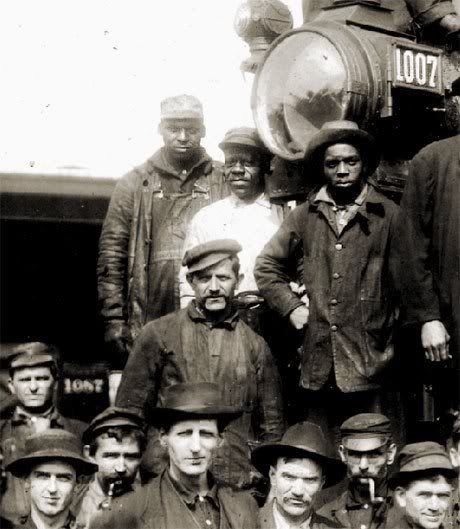
In 1907 the West African General Strike brought the African National movement to the attention of the people in the VSVR. Between March and August 1907 a series of Trade Unions would call strikes across West Africa. At first this was due to the perceived mistreatment of rail workers and concerns that many factories were more willing to employ white migrant workers from Europe rather than the local populations. Eventually the Strike became the fiery birthplace of Pan-Africanism as the protesters’ demands turned from economic to political. Huge crowds of workers assembled across the cities of West Africa united in their demands for self determination.
The political fallout was hugely significant. The Marxists asserted that whilst West Africa was already well developed the vast stretches of land from the Sahel to the Congo and onwards to Zimbabwe were all still in their infancy in terms of their ‘socialisation’. If all of Africa became independent now then these areas would never be developed as West Africa could never mount the same quantity of capital for the process as Europe. Both Anarchists and Marxists were also worried that the movement was motivated by ethnic tensions between the white European migrants (largely Germans, Flemings and Russians) and the native African populations (although in West Africa most of the industrial workers had migrated themselves from other parts of the continent). In the end this made it shockingly easy for Anton Drexler to outstretch the hand of friendship to the Pan-African movement (to the horror of the radical wing of his faction) as he invited Sylvester-Williams to Cologne from where he could more effectively lobby for African independence. The popularity of the National Communists continued to soar.
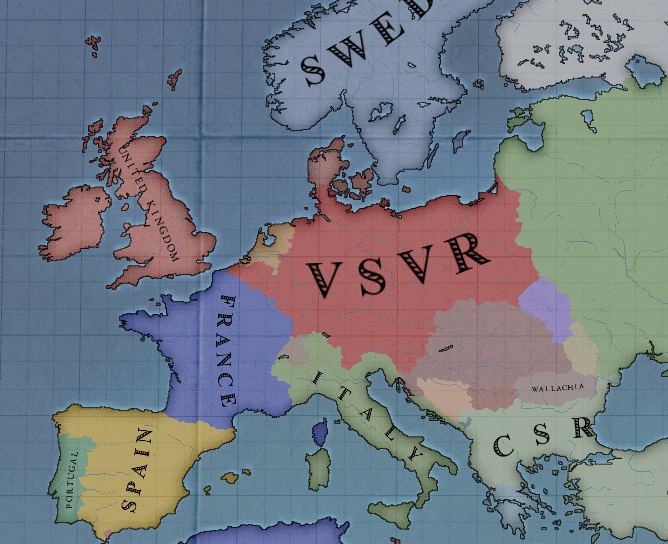
On July 14th 1908 the long awaited union between the VSVR and the Austrian Provisional Territory was completed. The union brought 34 million new citizens into the Republic and left the VSVR with major problems of unemployment in Moravia and Galicia and a labour shortage in the Austrian heartland – the only prosperous territory was Slovenia. All the new regions received a huge stimulus as modern industries were set up across the region and the state set up schemes to encourage rural-urban migration in the Austrian heartland provinces.
The period of 1905 until 1910 was one of extreme economic success, surprisingly widespread peace, the emergence of a united capitalist block for the first time and the birth of African Nationalism. The troika government had survived mostly due to its non-radical stance on all things. This might have suited Emma Goldman but it left Drexler eager for further reform and Trotsky seemingly truncated and ineffectual.
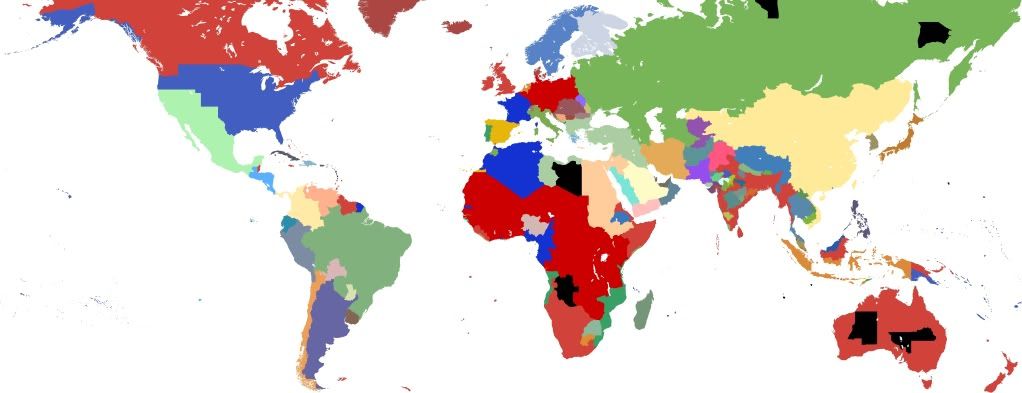
World in 1910.
The troika government in the VSVR during Trotsky’s 2nd term as Chairman made it very difficult for major changes to take place as every policy required the support of Trotsky, Goldman and Drexler. Beyond the initial political convulsions of early 1905 few major changes took place within the VSVR (with two major exceptions that shall be dealt with later). However beyond the borders of the Republic and beyond the Comintern the capitalist and feudal world was going through a period of unprecedented turmoil.

The Western world had experienced Red Scares in the past. The usually coincided with aggressive foreign policy coming from Cologne but the Red Scare of the early 20th century was of unprecedented magnitude. At the turn of the century the Labour Party in Britain and the ASP in the US were the two single largest political parties in their respective countries and were only contained by coalitions of liberals and conservatives. Prior to Trotsky’s assumption of power in the VSVR both frequently supported the First International and had positive, if strained, relations with Cologne. The Great War changed all this as both political parties damned the Comintern and took definite shifts to the right in order to disassociate themselves with the rising anti-communist emotions running through their countries. After the war these more moderate socialist parties seemed to have managed to survive the storm. However the Red Scare was only just beginning.

In 1904 the Republican Democrats ran against the ASP in what was expected to be a tight race for the Presidency. However big buissness united around the Republican Democrats in a manner unseen before in the history of Western democracy. The funding for Alton B. Parker’s Presidential campaign was 10 times that spent by all sides in the previous Presidential election. The campaign seemed to be almost totally focussed upon smearing the Left. The ASP were portrayed as willing puppets of the Trotskyite conspirators who wished to bring Marxist tyranny to the fair shores of the United States. The ASP would bring down Christianity, deny the enterprising American the right to better himself and would slaughter all those who did not bow before the alters of Lenin and Marx. The Reds would invite Germans into the homes of Ney Yorkers to rape their daughters and would hand over the farms of the South to be collectivised and handed over the black minority who would in turn gratefully send the profits funnelling into projects to beautify Cologne and Petrograd.

Parker smashed to victory winning over 75% of the popular vote and all but 4 states (New York, Ohio, Michigan and Massachusetts – ie the most industrial parts of the country). In his opening address to the nation he swore to roll back international Trotskyism, defeat the Red enemy within and empower the common man not through collectivism but through a freer and more open market. The reactionary backlash had begun.

It didn’t take long for an anti-communist witch hunt to begin as more radical members of the ASP were revealed as agents of the VSVR (these claims were not entirely unfounded as many within the ASP did indeed support the VSVR and Comintern although these were in the minority of those persecuted). The Parker government also began a crackdown on Trade Unions – most notably the powerful Anarchist IWW (International Workers of the World). When workers went on strike in Detroit in protest against a local member of the ASP who had been jailed for treason the US army was sent in and 20 strikers were killed. Rather than provoke public outrage the incident hampered the Left. Many members of the ASP leftwing called out for action against the state – hopelessly misjudging the mood of the American people they further isolated the ASP and labour movement and made it all the easier for Parker to bring down the hammer against it.
On the international stage Parker travelled to London and Mexico City himself whilst US representatives travelled to Guatemala and Peking as Parker tried to organise a new League of Nations to hold back the socialist menace. Meanwhile Parker began a programme for rapid military expansion on both land and sea.
This period is traditionally seen as the beginning of the ‘Cold War’ in which the two great armed camps of the Capitalist and Feudal powers and the Socialist International faced each other. It very nearly turned hot in late 1905 as events in the Middle East boiled over.

During the late 19th century the Ottoman Empire and its CSR successor had invaded Egypt in almost a routine manner. Sometimes the Turks won and seized sections of the Levant, but more often than not they were driven out or simply tired and turned home. So when the CSR invaded Egyptian held Palestine in the summer of 1905 few states took too much notice – the VSVR sent arms to its friend whilst the British and Americans sent similar supplies to Cairo and Alexandria. However in September things changed. About 20 miles North of Jerusalem the Turks won a stunning victory and captured almost the entire Egyptian army. At the same time a Leftist peasant uprising in Southern Sudan forced what few troops the Egyptians had left to head south in order to secure the unruly region. Both the Levant and the Nile were now fully open to the CSR – Egypt could not be allowed to fall.

British or American intervention might have caused a wider conflict but by convincing the Central American powers to act the Anglo-Saxons could prop up Cairo without threatening war from Cologne. In October the USCA and in December Mexico began to send troops to Egypt to fight under the Egyptian banner against the Turkish invasion. Their impact was immediate. The extremely well equipped Central Americans and the numerous Mexicans combined to rout the CSR’s army near Jaffa and force them to withdraw from Palestine to the Lebanon and Syria. For several more months (as Romanian troops entered the fray on the side of the CSR) the two armies would battle over the powerful lines of fortresses in Syria and the Lebanon. The conflict finally came to an end in mid July 1906 just as Mexican troops approached Damascus – the CSR agreed to pay reparations and end the conflict.
It was a propaganda coup for the Capitalist Bloc as the seemingly unstoppable tide of the Comintern had been halted in its tracks by cooperation between the remaining powers. After the election of a fiercely anti-communist Tory PM in Britain who was heavily influenced by his young foreign Minister, Winston Churchill, the capitalist powers officially looked to sign an alliance. Churchill proved to be the master diplomat as he convinced the Chinese and Japanese Emperors alongside the Presidents of the USCA and Mexico to align with Britain and America – the two Anglo-Saxon powers whose economic interests still dominated those countries at the expense of their people. All powers agreed to intervene if ‘’the international influences of communism ever threatened to destroy the peace of the world again’’ – this vague agreement left plenty of room for the powers but set down a general idea that they would stand together should the VSVR strike again.
With the Red Scare sending the Left back generations in Britain and America one might wonder what occurred in the non-democratic members of the new anti-communist alliance.

In China opposition to the totalitarian rule of the corrupt Imperial court – secured almost solely by the unstoppable might of the Chinese Army – was extremely powerful. However, despite this power, the opposition remained divided. Nationalists, liberals, communists, religious minorities and general progressives were not strong enough to fight against the Imperial state. This had already been made clear by the brutally suppressed Muslim uprising in 1903 and then a major communist uprising in South China in 1905. Both had ended only in the deaths of thousands of civilians. As time progressed and opposition grew the state was only becoming more brutal and monolithic. With the assistance of a British instructed bureaucratic machine and Western arms and training the state now wielded a larger and more powerful army than ever before. This was where Dr Sun Yat-Sen came in. Sun Yat-Sen was the leader of the single largest oppositions force, the People’s Party – largely liberal Republican institution, and favoured the idea of a Popular Front against the Emperor.

This led to the foundation of the Kuomintang (Nationalist Chinese People’s Party) in 1907. The KMT represented a colossal opposition force with influence in every party of the vast Chinese Empire. The KMT alliance consisted of the People’s Party, the Communist Party of China, the Progressive Front, the Liberal Alliance, the Muslim Brotherhood, Republican League, the Chinese Labour Association, The Peasant Alliance, the Viet Minh and dozens of smaller bodies. One huge Popular Front against the Imperial state.
Whilst the KMT seemed to be a new superpower its foundation caused indignation in Cologne. The Marxists were furious that the CCP had joined the Party as by doing so they allowed Sun Yat-Sen to monopolise the opposition to the state in the form of a bourgeoisie party. Within the Comintern Trotsky’s reputation took a major blow from this opposition as many rallied around Plekhanov who backed the KMT wholeheartedly and even began to clandestinely send arms across the border into Manchuria, Mongolia and Turkestan.
In Mexico and Central America unrest was at a much lower stage. Both states had their heavily industrialised areas. Mexico City had become an industrial sprawl to rival anything in the American North-East whilst the Californian coast had become a major centre of industry. In Central America there was perhaps half a dozen major industrial centres scattered across the nation. Yet in both countries the vast majority of the people were simply rural peasants who continued to endure a Feudal lifestyle with few modern comforts and plenty of state mandated oppression. In 1909 a major event would occur that would later become one of great significant for both states.

In 1908 a small village in Southern Mexico had elected the reasonably young middle class Mexican Emiliano Zapata to represent them in a dispute with their Feudal landlord. At first the landlord, fearing an insurrection, gave the village some concessions. With this a wider peasant movement demanded fairer treatment began to arise in both Mexico and the USCA. However, fearing the ballooning of the movement, in 1909 Mexican soldiers arrived in Zapata’s village and attempted to kill the idol of the peasantry and crack down on the centre of the peasant movement. Luckily Zapata was away at the time and was able to escape into the wilderness where he would begin to build up a powerful insurrection against the state.
Back in the VSVR 1906 saw the large scale reinstitution of Trade Unions at the behest of Drexler and the National Communists. Drexler had long been very moderate in his demands but facing pressure from bellow he went so far as to threaten to walk out of the troika if the Unions were not restored. From 1906 they would have little actual power but were able to represent the proletariat on an industry wide scale across the VSVR.

Economically the second half of the 1900s was perhaps the greatest period in the entire history of both the VSVR and the Comintern as a whole. In the VSVR, at least, the period also radically reshaped the country. Between 1905 and 1910 the VSVR industrial sector grew by an incredible 44% - considering the sheer size of the VSVR industrial sector these figures are truly mind boggling. That is the equivalent to two and a half Soviet Unions or three Chinas. Whilst the old industrial sectors did see major growth it was the new ‘modern’ industries that reported the most impressive profits and really changed the VSVR. Electrification had been an ongoing process since the 1890s but by the end of the 1900s it would be largely completed. With huge new factories pumping out telephones, electrical parts, automobiles, bicycles, tractors, new ships and even airships the country became a very different place. There was a tractor on every farm, mass proliferation of new forms of transport and the country became more connected than ever before. Whats more, with such large surpluses of manufactured goods millions across the entire Comintern received the benefits of being able to purchase the new modern goods being built in factories from Berlin and the Ruhr to Guinea and the Congo Basin.

However economic success was not limited to the VSVR but was spread across the International. The so called ‘Socialist Tiger’ economy of Hungary proved to be the flagship of the Comintern wide boom. In the immediate aftermath of the Great War the Hungarian industrial sector had crashed and the state was only saved by VSVR funds that kept it afloat. However starting in 1904 Hungary began one of the most incredible periods of economic growth ever seen. Between 1904 and 1910 the industrial sector grew by 500% as the Hungarian industrial sector went from being the 19th to the 9th largest industrial sector on earth. At the same time agricultural output doubled and mining output increased by 80%. Indeed by the end of the decade, whilst still mid-boom, Hungary had started to exert its pretences to Great Power status as it doggedly pursued Mexico. Elsewhere the Spanish industrial sector grew by 200%, the Dutch by 50%, the Swedish by 40% whilst Chile, Argentina and Peru had all experienced major growth. Even the larger and already industrialised economies of the Soviet Union and France experienced strong growth with the Soviet industrial sector growing by 25% and the French by a not unimpressive 15%. However there was less encouraging news from elsewhere. Many states, most notably Brazil, failed to grow at all whilst Italy faced a contraction of 30% in its industrial sector after a failed attempt to transition from unprofitable textile industries to more modern industries resulted in a General Strike and large scale industrial failure.

Perhaps the most significant political change in the VSVR during this period was the emergence of Pan-Africanism. Henry Sylvester-Williams was the driving force behind that movement. Particularly in the increasingly industrial Western regions of VSVR controlled Africa the growing class consciousness of the workers was creating a sense of conflict. Most were thankful to the VSVR for the introduction of socialism, economic prosperity and unprecedented levels of education in the region but by the early 20th century West Africa was no longer being propped up by the European VSVR but was actually a net contributor in the Republic’s finance (few of the old and unprofitable industries were present in the more modern and streamlined West African economy). Sylvester-Williams was originally born in the British colony of Trinidad in 1869. Educated in London he worked as a lawyer in South Africa during the 1890s. However after witnessing the poor treatment of native black African population by the British and Boers alike he became involved in radical politics. Advocating an independent, democratic, Pan-African state he was quickly drawn to the far left. During the Great War he was forced to leave South Africa after becoming involved in an anti-British guerrilla movement in the Zimbabwe and Zambia (then occupied by British forces). After the war he settled in the industrial city of Dakar – the effective capital of VSVR West Africa. From there he played a major role in the formation of the idea of African Nationalism – the idea had been present since the VSVR first arrived in Africa two decades before but it did not truly come to a head until the late 1900s.

In 1907 the West African General Strike brought the African National movement to the attention of the people in the VSVR. Between March and August 1907 a series of Trade Unions would call strikes across West Africa. At first this was due to the perceived mistreatment of rail workers and concerns that many factories were more willing to employ white migrant workers from Europe rather than the local populations. Eventually the Strike became the fiery birthplace of Pan-Africanism as the protesters’ demands turned from economic to political. Huge crowds of workers assembled across the cities of West Africa united in their demands for self determination.
The political fallout was hugely significant. The Marxists asserted that whilst West Africa was already well developed the vast stretches of land from the Sahel to the Congo and onwards to Zimbabwe were all still in their infancy in terms of their ‘socialisation’. If all of Africa became independent now then these areas would never be developed as West Africa could never mount the same quantity of capital for the process as Europe. Both Anarchists and Marxists were also worried that the movement was motivated by ethnic tensions between the white European migrants (largely Germans, Flemings and Russians) and the native African populations (although in West Africa most of the industrial workers had migrated themselves from other parts of the continent). In the end this made it shockingly easy for Anton Drexler to outstretch the hand of friendship to the Pan-African movement (to the horror of the radical wing of his faction) as he invited Sylvester-Williams to Cologne from where he could more effectively lobby for African independence. The popularity of the National Communists continued to soar.

On July 14th 1908 the long awaited union between the VSVR and the Austrian Provisional Territory was completed. The union brought 34 million new citizens into the Republic and left the VSVR with major problems of unemployment in Moravia and Galicia and a labour shortage in the Austrian heartland – the only prosperous territory was Slovenia. All the new regions received a huge stimulus as modern industries were set up across the region and the state set up schemes to encourage rural-urban migration in the Austrian heartland provinces.
The period of 1905 until 1910 was one of extreme economic success, surprisingly widespread peace, the emergence of a united capitalist block for the first time and the birth of African Nationalism. The troika government had survived mostly due to its non-radical stance on all things. This might have suited Emma Goldman but it left Drexler eager for further reform and Trotsky seemingly truncated and ineffectual.

World in 1910.
If your wondering about Hungary, I have to say I'm very impressed. By this stage they are about 10-50 points behind Mexico around the 1000 point mark and have a very real chance of becoming a GP. Annoyingly they are perhaps the most valuable state I have in my SoI so this would harm me. Yet a 4th socialist GP, and Hungary of all places too, would be pretty cool. 
ps The Blue places in the Pacific are American.
ps The Blue places in the Pacific are American.
Look, comrades! The bourgeoisie unite against us. They murder and oppress the socialists of their own states. It shall not be long until a second "World War" breaks out, one which may truly be the final conflict in human history. If one side wins, the other shall be extinguished.
I must say I am surprised at the Troika. Peace has been preserved, we have witnessed unprecedented economic growth and prosperity. So long as the circumstances continue, the Troika should continue also!
(( I'm guessing the National Communists would fraction if Africa was given independence. Racists vs little-bit-less-Racists. How much does it contribute to your score now anyway?))
I must say I am surprised at the Troika. Peace has been preserved, we have witnessed unprecedented economic growth and prosperity. So long as the circumstances continue, the Troika should continue also!
(( I'm guessing the National Communists would fraction if Africa was given independence. Racists vs little-bit-less-Racists. How much does it contribute to your score now anyway?))
- Status
- Not open for further replies.

